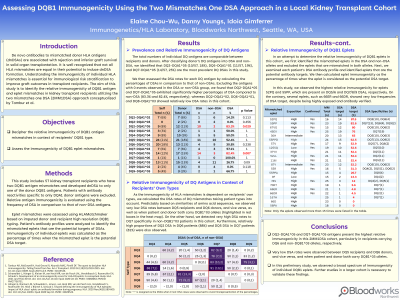Assessing DQB1 Immunogenicity Using the Two Mismatches One DSA Approach in a Local Kidney Transplant Cohort
(P214) Assessing DQB1 immunogenicity Using the two mismatches one DSA approach in a local kidney transplant cohort
Location: Platinum Ballroom


Elaine Chou-Wu, PhD, F(ACHI)
Bloodworks NW
Poster Presenter(s)
Aim: De novo antibodies to mismatched donor HLA antigens are associated with rejection and inferior graft survival in solid organ transplantation. Therefore, understanding the immunogenicity of individual HLA mismatches is essential to improve transplant outcomes. In this study, we attempted to identify the relative immunogenicity of DQB1 antigens utilizing the two mismatches one DSA (2MM1DSA) approach conceptualized by Tambur et al.
Method: A total of 57 kidney transplant recipients who have two DQB1 mismatches and developed de novo DSA (dnDSA) to only one of the donor DQB1 antigens were included. Patients with antibody reactivities specific to only DQA1 donor antigens were excluded from the study. Relative immunogenicity is evaluated using the frequency of DSA antigens in comparison to that of non-DSA antigens.
Results: In this study cohort, DQ2-DQA1*05 (18%), DQ7-DQA1*05 (25%), and DQ5-DQA1*01 (19%) were the most prevalent DSA antigens (Table 1). Furthermore, DQ2-DQA1*05 and DQ7-DQA1*05 showed significantly higher percentages in DSA, compared to non-DSA alleles (4% and 5 %, respectively). Accordingly, these two antigens exhibited the highest DSA rates when mismatched (83% and 82%, respectively). As the immunogenicity of HLA mismatches is dependent on recipient’s own HLA types, we calculated the DSA percentages of DQ mismatches taking patient types into account. Overall, DQ7 had the highest DSA rates specifically in non-DQB1*03 patients. A relatively high proportion of DQ2 DSA in DQ6 patients (88%), and DQ5 DSAs in DQ7 patients (81%) were also observed. Expectedly, low DSA rates were observed between DQ5 recipients and DQ6 donors, and vice versa, as well as when patient and donor both carry DQB1*03 alleles, due to the similarities of amino acid sequences between these proteins.
Conclusion: Our study showed that DQ2-DQA1*05 and DQ7-DQA1*05 antigens present relatively higher immunogenicity compared to other DQB1 mismatches in this 2MM1DSA cohort, and provided preliminary data of differential immunogenicity of donor DQB1 antigens based on recipients’ types. Further studies in a larger cohort and identifying the immunogenic epitopes on these antigens are needed to further decipher the immunogenicity of DQB1 molecules.
Method: A total of 57 kidney transplant recipients who have two DQB1 mismatches and developed de novo DSA (dnDSA) to only one of the donor DQB1 antigens were included. Patients with antibody reactivities specific to only DQA1 donor antigens were excluded from the study. Relative immunogenicity is evaluated using the frequency of DSA antigens in comparison to that of non-DSA antigens.
Results: In this study cohort, DQ2-DQA1*05 (18%), DQ7-DQA1*05 (25%), and DQ5-DQA1*01 (19%) were the most prevalent DSA antigens (Table 1). Furthermore, DQ2-DQA1*05 and DQ7-DQA1*05 showed significantly higher percentages in DSA, compared to non-DSA alleles (4% and 5 %, respectively). Accordingly, these two antigens exhibited the highest DSA rates when mismatched (83% and 82%, respectively). As the immunogenicity of HLA mismatches is dependent on recipient’s own HLA types, we calculated the DSA percentages of DQ mismatches taking patient types into account. Overall, DQ7 had the highest DSA rates specifically in non-DQB1*03 patients. A relatively high proportion of DQ2 DSA in DQ6 patients (88%), and DQ5 DSAs in DQ7 patients (81%) were also observed. Expectedly, low DSA rates were observed between DQ5 recipients and DQ6 donors, and vice versa, as well as when patient and donor both carry DQB1*03 alleles, due to the similarities of amino acid sequences between these proteins.
Conclusion: Our study showed that DQ2-DQA1*05 and DQ7-DQA1*05 antigens present relatively higher immunogenicity compared to other DQB1 mismatches in this 2MM1DSA cohort, and provided preliminary data of differential immunogenicity of donor DQB1 antigens based on recipients’ types. Further studies in a larger cohort and identifying the immunogenic epitopes on these antigens are needed to further decipher the immunogenicity of DQB1 molecules.
